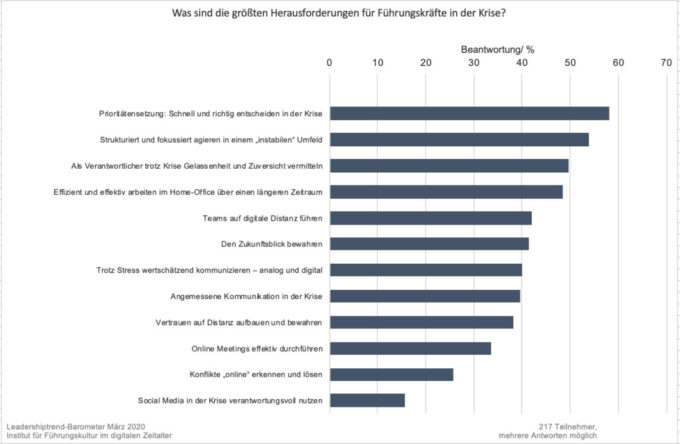Leadership: Who is challenged and in demand in the crisis?
Leadership Trend Barometer of the IFIDZ shows: In the Corona crisis, managers are in demand above all as decision-makers who give their employees the necessary orientation and radiate confidence despite all the changes.

What does leadership mean? "From your point of view, what are the greatest challenges for leaders in the current crisis? This is what the Institute for Leadership Culture in the Digital Age (IFIDZ), Frankfurt, wanted to know in its current Leadership Trend Barometer. The online survey showed that during the crisis, managers are primarily in demand as decision-makers as well as leaders and controllers of their areas; they are also in demand as personalities who offer their employees orientation and support during the crisis.
Most of the 217 survey participants named "Setting priorities: Making the right decisions quickly in a crisis" as a key challenge (58 percent; multiple answers possible). Hardly fewer saw "Acting in a structured and focused manner in an 'unstable environment'" (54%) as a major challenge, closely followed by the challenge of "Conveying composure and confidence as a responsible person despite the crisis" (50%).
According to Barbara Liebermeister, head of IFIDZ, these results are not surprising, because: "When a crisis like the Corona crisis makes all strategies and plans of the companies obsolete, the first management task is to reflect on the changed situation and to set new priorities - "which is a very challenging task in a situation where many markets collapse", because: Only then is effective crisis management possible. At the same time, this is the prerequisite for a leader to radiate composure and the confidence "We can do it" despite the crisis and to give the employees the desired orientation and the necessary support.
Compared to this, all other challenges are of secondary importance or, like the tasks of "managing teams at a distance" or "conducting online meetings effectively", they already result from measures to overcome the crisis, such as more employees working in home offices. What is striking, however, is that more than 40 percent of those surveyed emphasize that a major challenge is to maintain a "view of the future" in the current situation - and not to fall into blind actionism. According to Patrick Merke, member of the IFIDZ Institute management, this is understandable in a situation in which the world seems to be collapsing, but it is all the more important to redefine the goals when leading if necessary and to set the right priorities in everyday work and management.
For Barbara Liebermeister, the results of the current trend barometer are also an indication of how far removed from reality some management discussions have been in recent years - for example, the discussion about the extent to which leadership will still be necessary in companies in the future. Particularly now in the crisis, she says, it is becoming clear how indispensable managers who also see themselves as decision-makers and not just as coaches for their employees are for the success of companies; moreover, managers who provide their employees with the framework and objectives of their actions and thus also offer them the necessary orientation.

For more information on the results of the latest IFIDZ Leadership Trendbarometer, please visit the IFIDZ website (www.ifidz.de) in the studies section.









